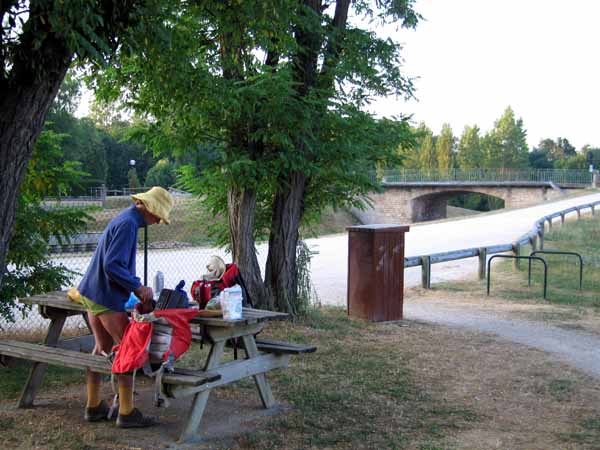
Saturday, 1 July 2006
Distance 18 km
Duration 3 hours 45 minutes
Ascent 57 m, descent 36 m
Map 28 of the TOP 100 blue series (now superseded)
Most unfairly, Keith gave me a pinch and a punch before I was fully awake.
We packed up our little camp in just a few minutes, and moved out to a picnic table near the towpath, with a spreading tree and a view down the canal. The last of the cherries stolen on the way to Auxerre enlivened the muesli.
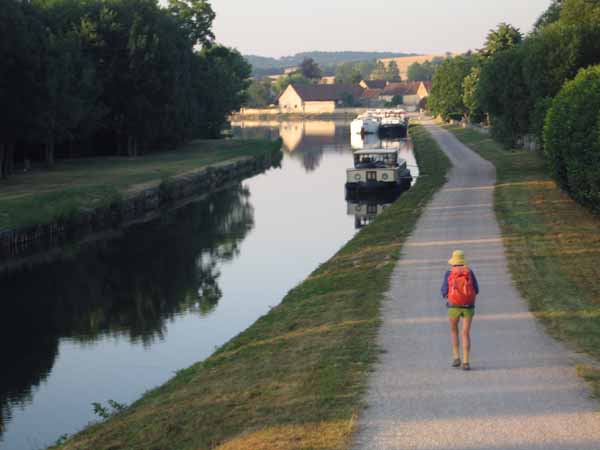
At 6:50 we set off along the towpath, with the sun behind us and all the fresh morning to ourselves. There was no sign of life from the pleasure boats till 10 o’clock.
The water was glassy, disturbed occasionally by a startled otter or heron, and a wind turbine stood motionless.
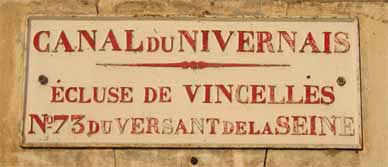
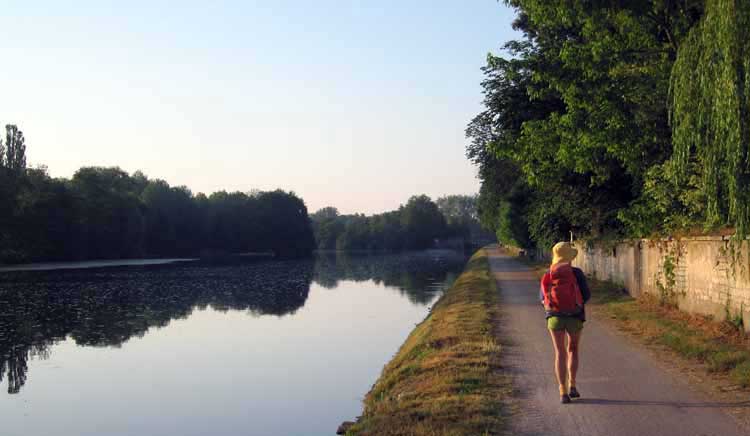
We passed several locks, for which the nearby meandering river served as a weir.
Often these locks have flower gardens, or even vegetables growing around them, neat and flourishing. I would do that if I were a lock-keeper.
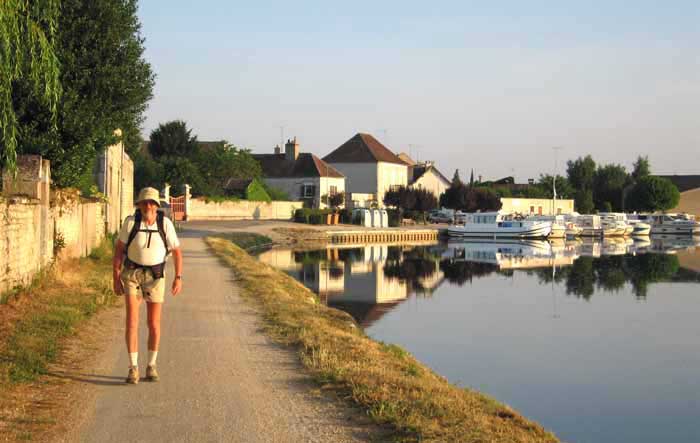
It was no more than an hour until we reached the bridge at Cravant, and approached the splendid inn of three days ago from the opposite direction, making the only point of repetition on our long journey.
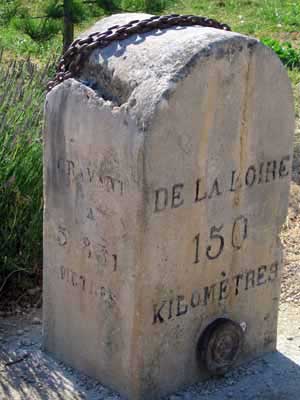
The barman remembered us, or pretended to, bless his heart. This time there were no croissants on the counter, but we had my clafoutis from last night to accompany the coffee.
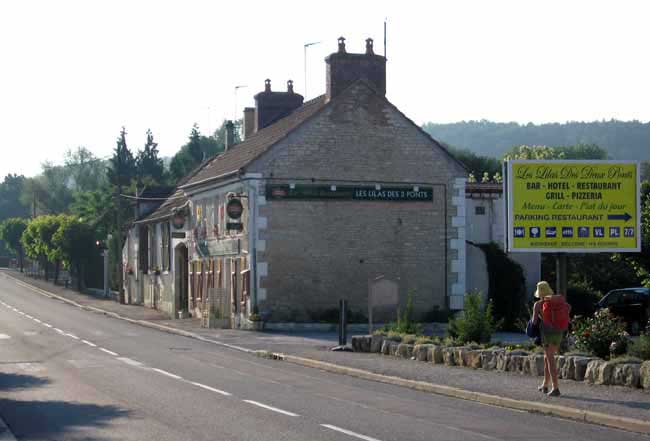
Back on the towpath, we powered along past several small villages.
The going was so flat that we started to wonder whether we had lost our hill-climbing muscles altogether, a proposition that was about to be tested.
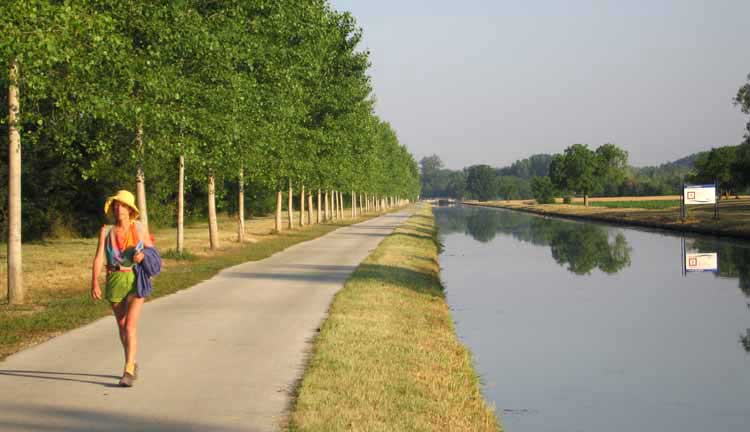
By the time we got to Mailly-la-Ville, we were ready for another caffeine shot and crossed the bridge to the right.
This turned out not to be such a good idea, as all the shops were on the side we had just come from, but we did find a bar commanding a pleasing stretch of the river.
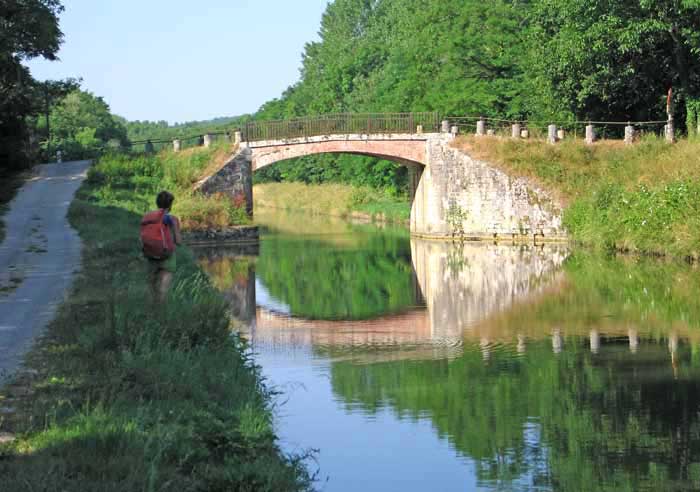
We were in need of bread and our host said there was a boulangerie in Mailly-le-Château. He also told us of a short-cut to the camping on a tiny local road.
As soon as we got to the camping ground, green and spacious, we threw down our packs, changed into sandals and set off to catch the boulanger before closing time.
What our host had failed to tell us was that Mailly-le-Château is on a precipice high above the surrounding countryside, a circumstance that could not be foreseen on our map as the contours were obliterated by a mass of tourist symbols indicating the chateau, two churches and two viewpoints.
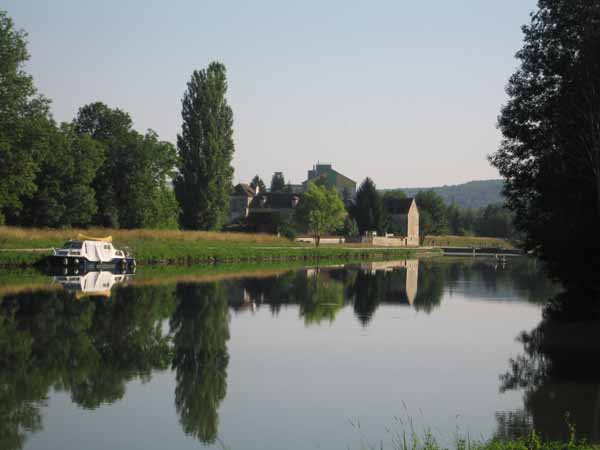
The road up was a steep switchback baked by the midday sun. We felt distinctly hard-done-by toiling up, with the walls of the village looming over us, every step confirming that our hill-climbing muscles had indeed wasted away.
Having arrived at what looked like a ghost town, we dashed about looking for a boulangerie. An old woman in a doorway directed us down one of the canyon-like streets and we got our foot in the door as it was closing for the afternoon (it closed behind us as we went out).
We got enough bread for lunch, but later realised that we should have got more, as we had no wish to come back up again and would have to have a picnic meal in the evening with the scraps we had salvaged last night.
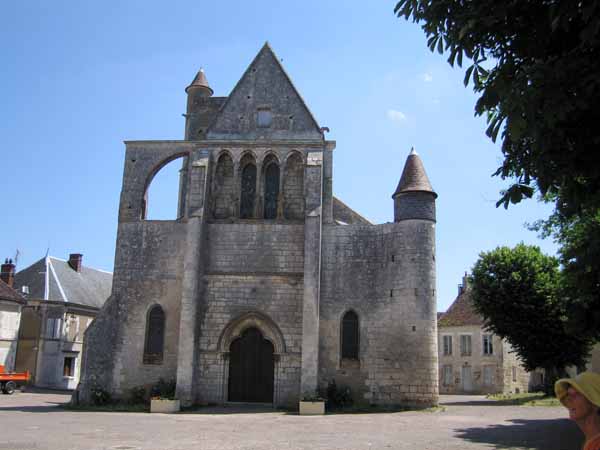
The village has a great deal of charm, we realised as we strolled back. The church, commanding a wide square, was so ancient and lop-sided that it was almost comical. The were lanterns of the dead in the cemetery – stone towers with a light at the top, keeping watch over the souls of the dead.
The way back was easy, because we found a grassy footpath plunging directly to the river road. As we went under the railway bridge it occurred to us that, although the river and the road both made an extravagant meander at this point, the railway line did no such thing and we could save a good distance by following the train tracks tomorrow.
I took the opportunity, walking on the hot tar road, to mend the flapping sole of my sandal with molten bitumen, a simple and effective remedy.
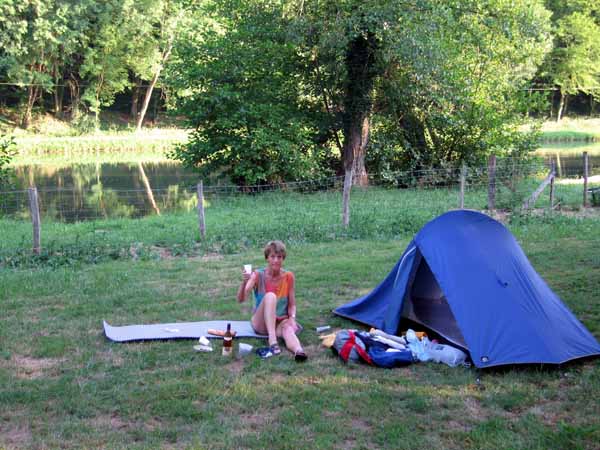
Back at the camping ground, we set ourselves up on the water’s edge and had a frugal lunch of half our bread and some cheese, reserving the other half and the charcuterie for the evening. The man in charge came round, a thoroughly trendy fellow, tanned, lined, convivial, decked out in white rolled-up pants.
He declined our offer to pay straight away, as he didn’t want to bother with the paperwork, and swore he would be on hand at 7 am tomorrow, before we left.
In the centre of the broad park he had set up a big plastic roof over a group of picnic tables, with a TV at one end, so at 5 pm the campers gathered for the semifinal between England and Portugal. Portugal won, to general satisfaction. It would have been nice to see the faces of the odious Pommies from last night.
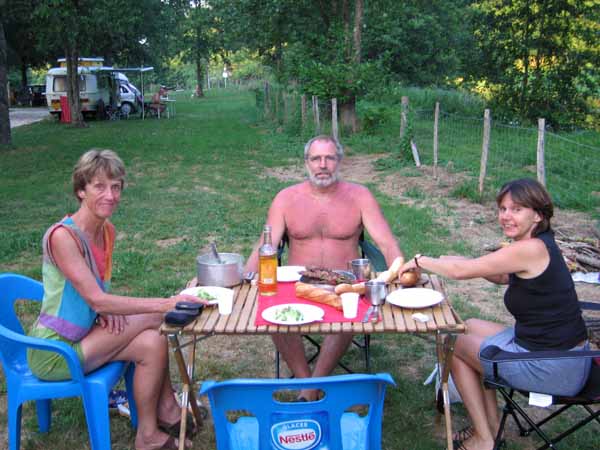
Before the second semifinal we bought a bottle of wine and some olives from our host and sat down to enjoy them.
A burly, badly sunburnt German came over and invited us to share their dinner, having found out we were Australian whilst watching the match. He had spent two years in Australia in his youth. His wife was from a later period of his life.
We had a glorious feast – melon swimming in Muscadet, grilled kebabs with salad, bread and wine. Our new friend talked wistfully of his lost Australian girlfriend, without appearing to upset his wife. After a pause to watch France win the second semifinal (delirious joy all round), we had crèmes caramels.
They had been bought at the supermarket at Vermenton that day, a fact that was hard for us to comprehend, as Vermenton to us was a distant place, four days’ walk away. So a potential night of privation became a pleasant social occasion.
Previous day: Auxerre to Vincelles